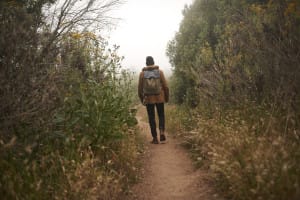Therapists who treat addiction and co-occurring mental conditions have many weapons in their arsenal: psychotherapy, 12-step strategies, experiential exercises, education, medications and perhaps one more: Mother Nature. In a novel experiment, researchers at Stanford University in California randomly assigned 38 people to take a 90-minute walk in either a natural or urban setting, then assessed them on their levels of repetitive negative thoughts about themselves, a behavior that is associated with depression and other mental health issues. The investigators found that after their trek, nature walkers reported a significant decrease in rumination and also had less brain activity in a portion of the brain associated with risk for mental illness. Participants who walked in an urban environment did not receive the same benefit. Published in the Proceedings of the National Academy of Sciences journal, the study is important because it offers much-needed scientific credence to nature-based therapies, such as adventure or wilderness therapy, for the treatment of addiction and other mental health disorders.
The Power of Nature Therapy
Therapists who specialize in nature-based therapy, however, don’t need a study to convince them that walking in nature can be therapeutic for individuals struggling with substance abuse and co-occurring disorders. “I see miracles happen all the time when clients get outdoors,” says Megan Repass, MS, an experiential therapist for the adventure and wilderness therapy program at The Ranch in Nunnelly, Tennessee. Repass often takes clients on “vision walks” deep within the 3,800 acres of woods, streams, paths and critters in nearby Montgomery Bell State Park. Hiking in the forest, where the sounds of the city give way to the deeply primal sounds of nature, clients quickly learn to turn off negative self-talk. “When you’re alone and walking in the forest, it is amazingly loud,” Repass says. “One client who was initially reluctant to do a hike, told me afterward, ‘When I finally focused on the sounds that I heard — the birds singing, leaves rustling, the wind, even dew falling off the leaves — it was screaming loud. It was so loud I was no longer able to listen to my negative self-talk.’” In that moment in the forest, Repass says, the client had an important breakthrough.
Finding Truth in Nature
Walking in nature also offers lessons in authenticity, which can be powerfully helpful for someone struggling with substance abuse. “The forest and everything in it are essentially untouched by man and everything that led up to rehab,” says Repass. “There are no billboards or cultural images telling you who you should be; you’re absorbing something that is absolutely real and much bigger than your problems.” Embraced by nature, clients can get a clearer sense of what matters and of who they are. “It’s also very hard,” she says, “to not feel some type of spirituality or connection to a higher power when you are surrounded by Mother Earth; beginning to believe in a creator is possible when you are immersed in nothing but the beauty of creation.”
Metaphors in Nature
Before the hike, Repass encourages her clients to be open to whatever they see, hear or feel. Often they will see deer, squirrels or foxes, but many times, they find meaning in something they find along the trail. One client was moved at the sight of a tree growing out of a rock, which exemplified the emotional resilience that she hoped to one day attain. Another client, while sitting near a waterfall, noted how slowly dripping water had over hundreds of years worn a deep crevice into a boulder. The client suddenly connected with the concept of exercising patience and resolve in his own recovery process and understood that change was possible. “Whether the lesson involves a tree, or rock or waterfall,” Repass says, “we can see the tools and skills and characteristics in nature that we want to instill in our own life.”
Taking Nature Lessons Home
Not everyone has a national forest in his or her backyard, so how do clients take these lessons home? Simple, says Repass. “I encourage clients to find a spot for themselves, whether it’s a state park, a local park or a garden that they’re going to build.” Even a raised garden bed on the rooftop of an apartment can provide a spot where “you can put your feet in the earth and ground yourself,” she says. For true urbanites living in a concrete jungle, she has some advice: “Go outside on your lunch break, turn off your phone, turn your head to the sun, and feel the warmth.” (Sources: PsychologyToday.com, WebMD.com, CNN.com, Proceedings of the National Academy of Sciences of the U.S.)


